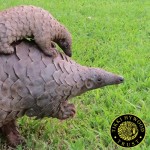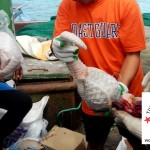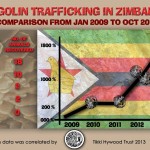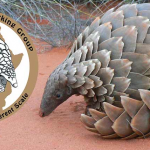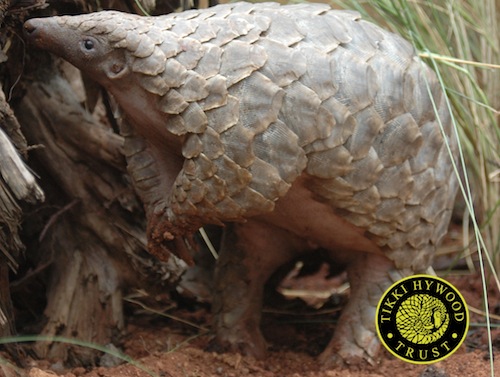
The 65th Meeting of the CITES Standing Committee held in Geneva yielded positive results for pangolins with the establishment of an intercessional working group on pangolins, which adopted a mandate calling for robust reporting requirements on pangolin trade and conservation.
On Wednesday, July 9, multiple interventions were made on behalf on pangolins regarding SC65 Doc. 27.1 Enforcement Matters.
#Pangolins take the floor by storm with multiple interventions #CITES #SC65
— Annamiticus (@annamiticus) July 9, 2014
Several pangolin range states, including India, Indonesia, mainland China and Hong Kong, expressed their concerns regarding the trafficking menace facing this species. India made its position clear, calling for a CITES Appendix I uplisting to prohibit all commercial trade in pangolins.
India calls for pangolins uplisted to #CITES Appendix I, no international commercial trade allowed. #SC65
— Iris Ho 何燕青 (@irislovesdc) July 9, 2014
Indonesia noted that its enforcement of laws protecting pangolins extends to combating anti-money laundering efforts. Hong Kong assured Parties that its enforcement efforts would be sustained. China said that consumption and/or smuggling of endangered species, such as pangolins, would result in a prison sentence (noting that a regulated quota from “historical” stockpiles would be used for medicinal purposes).
The United States and European Union recommended that the Standing Committee establish a pangolin working group and extend trade reporting to African pangolin range states. Canada noted that demand reduction must be accompanied by enforcement. NGOs were invited to intervene following the Parties.
#USA encourages #CITES Standing Committee to establish #pangolin working group #CITES #SC65
— Annamiticus (@annamiticus) July 9, 2014
Annamiticus, Co-Chair of the Species Survival Network (SSN) Pangolin Working Group, recommended during the NGO interventions that Parties who have not yet responded to the Notification are invited to do so in time for consideration by the 66th Standing Committee meeting; the Notification is expanded to include African pangolin range States; request all Parties to report on stockpiles of pangolin parts, and request range States to disclose their demand reduction efforts to address the illegal pangolin trade; encourage the Standing Committee to consider establishing a pangolin working group, to work intersessionally with a view to drafting recommendations based on the reports received from Parties. (The recommendation was drafted collaboratively by the SSN PWG.)
CITES SC65: much of afternoon session was dedicated to illegal trade in pangolin, a working group was set up
— CITES (@CITESconvention) July 9, 2014
Following the interventions, a pangolin working group Chaired by the European Union and comprised of source, transit and destination countries — and NGOs — was set up and met for the first time on Thursday, July 10, to draft its mandate:
1. Request the Secretariat to invite Parties to provide information on the conservation of and trade in Asian and African pangolin species, through a Notification, building on and expanding the request for information sent under Notification 2013/59, with information to be provided by 28 February 2015.
2. In preparation of the request under point 1, work with the Secretariat to prepare a questionnaire to assist Parties in compiling the information and to provide for a standardised approach for the replies.
3. Review the information provided by Parties following the Notification under point 1., and any other relevant information received.
4. Draft recommendations to address the illegal trade in pangolin species and report back on these recommendations to the 66th meeting of the Standing Committee.
Additionally, the mandate invites Parties to report on legislation, enforcement measures, stockpile volumes, captive breeding activities (“including the purpose of the respective activities”), demand management, and education and awareness. Download the mandate adopted by the working group on pangolins.
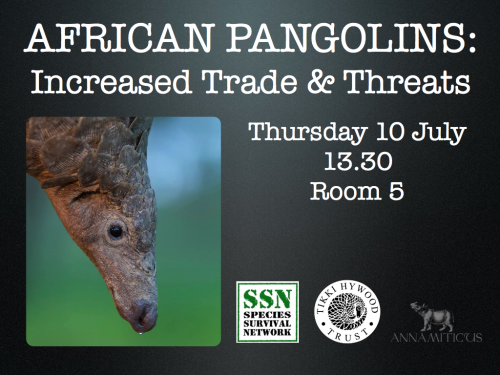
The focus on pangolins continued with a pangolin side event organized by the Species Survival Network. The presentation — African Pangolins: Increased Trade and Threats — was prepared and presented by Rhishja Cota-Larson (Annamiticus founder and Co-Chair of SSN Pangolin Working Group) and Lisa Hywood (founder of Tikki Hywood Trust, African Pangolin Liasion for Annamiticus, member of IUCN Pangolin and African Pangolin Specialist Groups).
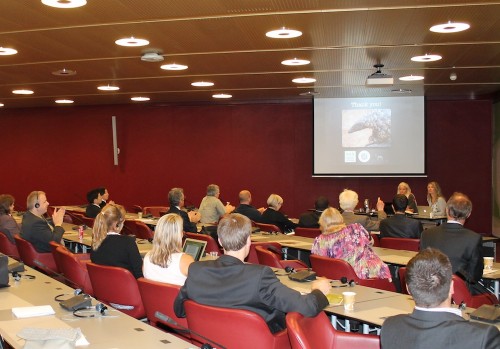
As Will Travers of Born Free Foundation said in his video address on the final day of the meeting, “Pangolins are, in a sense, the new poster animal for CITES.”
All of us at Annamiticus are encouraged by the progress made at the Standing Committee meeting and look forward to your continued support of our work to protect pangolins.

